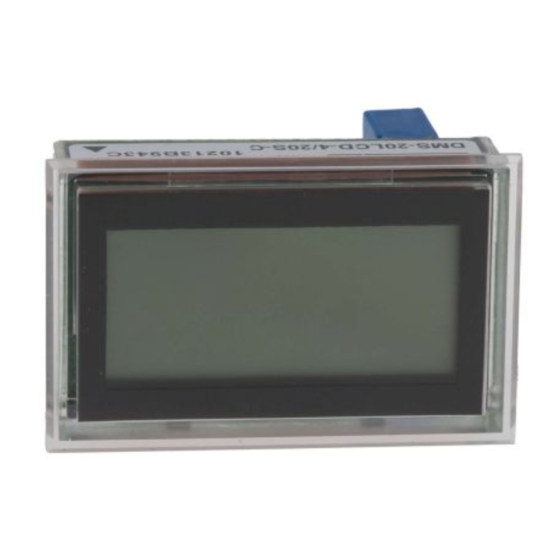Datel DMS-20LCD-4/20 Series Manual - Página 3
Procurar online ou descarregar pdf Manual para Monitor Datel DMS-20LCD-4/20 Series. Datel DMS-20LCD-4/20 Series 5 páginas. 4-20ma input loop-powered ultra-low 1.8v loop drop, 3 1/2 digit lcd-display process monitors

3 ½ D I G I T , L C D D I S P L A Y , 4 - 2 0 m A L O O P - P O W E R E D M E T E R S
DMS–20LCD–4/20B (Bipolar Reading Model)
The DMS-20LCD-4/20B's zero-offset circuit differs from the unipolar 'S'
model described above in that with the 'B' model, a half-scale 12mA input is
normally set to display "000". Therefore, all of the of the DIP-switch settings
in Table 2 assume a reading of "000" is desired with a 12mA input. Display
readings other than those shown in Table 2 are possible, contact DATEL for
more information.
When configuring the DMS-20LCD-4/20B for the first time, or when selecting
a new range, set both R3 and R7 fully clockwise (roughly 22 turns) to their
minimum offset/minimum-span positions, respectively. Then select the
desired readings from Table 2 and configure DIP-switches SW1, SW2, and
SW3 accordingly.
The procedure below illustrates how to calibrate the DMS-20LCD-4/20B to
its factory-calibrated readings of "–1000" with a 4mA input and "1000" with a
20mA input. When performing DIP-switch settings, be sure the DIP-switch's
small actuators are firmly engaged in their fully-ON or fully-OFF positions.
1. Set both R3 and R7 fully clockwise.
2. Select DIP-switch setting #1 from Table 2.
3. Apply a precision 12mA input and adjust R3 until the meter's display
reads "000".
4. Apply a precision 20mA input and adjust R7 until the meter's display
reads "1000".
5. Apply a precision 4mA input and the display should read "–1000".
Repeat steps 3 and 4 to make sure the two adjustments did not
affect one another.
Table 2. DMS-20LCD-4/20B (Bipolar Model)
DIP-Switch Settings
Display Reading
4mA
12mA
20mA
1. –600 to –1000
000
600 to 1000
2. –350 to –650
000
350 to 650
3. –250 to –400
000
250 to 400
4. –150 to –250
000
150 to 250
5. –100 to –150
000
100 to 150
Examples
(DMS-20LCD-4/20B-Bipolar Model)
1. Desired display readings are:
4mA = "–1.00"
20mA = "1.00"
Use DIP-switch setting #5 in Table 2 and enable decimal point DP2 via
SW5. Apply 12mA and adjust R3 so the display reads "0.00". Apply
20mA and adjust R7 so the display reads "1.00". Apply 4mA and verify
that the display reads "–1.00", readjust R3 and R7 if necessary.
DATEL, Inc., Mansfield, MA 02048 (USA) • Tel: (508)339-3000, (800)233-2765 Fax: (508)339-6356 • E–mail: [email protected] • Internet: www.datel.com
SW1
SW2
SW3
Off
Off
Off
On
Off
Off
Off
On
Off
Off
Off
On
On
On
On
ON
1
2
3
4
5
6
2. Desired display readings are:
4mA = "–450"
20mA = "450"
Use DIP-switch setting #2 in Table 2. Apply 12mA and adjust R3 so the
display reads "000". Apply 20mA and adjust R7 so the display reads
"450". Apply 4mA and verify that the display reads "–450". Repeat
adjustment procedure if necessary. For these display readings, no
decimal points are used. Set SW4, SW5 and SW6 to OFF.
3. Desired display readings are:
4mA = "–650"
20mA = "650"
Notice that these readings can be obtained using either DIP-switch
setting #1 or DIP-switch setting #2 in Table 2. In situations like this where
DIP-switch settings overlap, less-sensitive R3/R7 adjustments can be
achieved if the higher DIP-setting # is selected (setting #2 in this example).
Apply 12mA and adjust R3 so the display reads "000". Apply 20mA and adjust
R7 so the display reads "650". Apply 4mA and verify that the display reads "–
650". Repeat adjustment procedure if necessary.
DMS-20LCD-4/20P (Positive Reading Model)
The DMS-20LCD-4/20P's Zero-Offset circuit is optimized to produce
positive readings at both 4mA and 20mA input levels. As shown in Table 3's
first three columns, a 4mA input can be typically adjusted (using R3, Zero/
Offset Adjust) to display any positive reading between "000" and "800". The
corresponding 20mA-input reading is then added to the 4mA offset as a
differential whose magnitude is varied by adjusting R7 (Gain/Span Adjust).
The 'Differential Range' column in Table 3 lists the nominal differential
display-readings which can be obtained with R7 at, or very close to, its full-
clockwise, minimum span position. The Differential Range column can be
used as a guide when configuring the meter for the majority of user
applications. Higher differential ranges are obtainable; however, the use of
higher differential readings results in correspondingly-lower positive
readings with 4mA inputs, that is, R3's clockwise adjustment-range is
reduced. Example #3 below illustrates this concept. Please contact DATEL if
there is any doubt as to whether or not the DMS-20LCD-4/20P can be
configured for your display readings requirements.
The first step when configuring the DMS-20LCD-4/20P for the first time, or
when selecting a new range, is to set R3 fully counterclockwise and R7 fully
clockwise (roughly 22 turns) to their minimum offset/minimum span
positions, respectively.
The next step is to calculate the required display differential-reading; this is
accomplished by subtracting the desired 4mA display reading from the
desired 20mA display reading, disregarding decimal points. Then, using the
calculated differential display-reading to select the appropriate DIP-switch
setting # from Table 3, configure DIP-switches SW1, SW2, and SW3
accordingly. Make certain that the DIP-switch's small actuators are firmly
engaged in their fully-ON or fully-OFF positions.
The procedure below describes how to calibrate the meter for an applica-
tion which the DMS-20LCD-4/20P easily accommodates: displaying the
output of a 4-20mA transmitter, that is, "04.0" with a 4mA input and "20.0"
with a 20mA input.
3
DMS-20LCD-4/20
ON
1
2
3
4
5
6
ON
4
1
2
3
5
6
